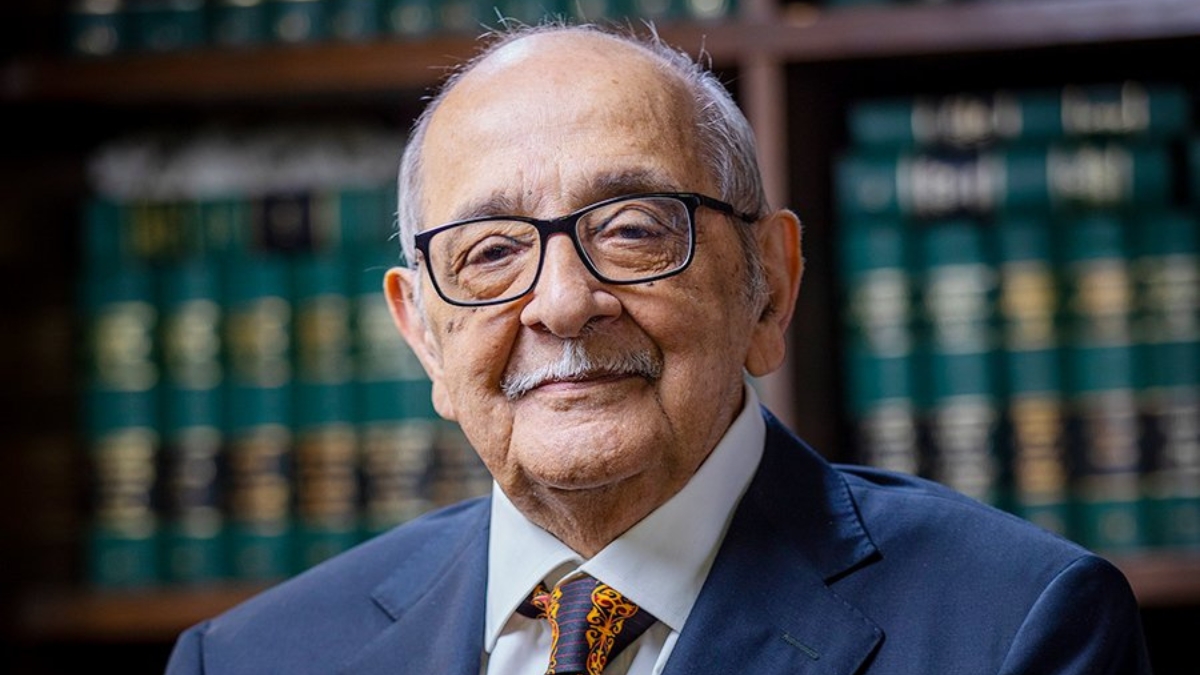- By News Desk
- Thu, 22 Feb 2024 12:06 AM (IST)
- Source:JND
Fali S. Nariman, a distinguished legal expert and Senior Advocate, passed away on February 21 at the age of 95. Over his extensive 75-year career in law, he primarily served as a senior advocate at the Supreme Court of India for the past five decades. Throughout this period, he made significant contributions to the legal field and played a pivotal role in numerous landmark cases.
Fali S Nariman: the beginning of a jurist
Following his graduation in 1950 from the Government Law College in Mumbai, Nariman started working at the Bombay High Court. In 1961, he received the designation of Senior Advocate. He relocated to Delhi ten years later to work at the Supreme Court of India. The administration of Indira Gandhi designated Nariman as an Additional Solicitor General in 1971. In 1975, he left this position due to the declaration of a national emergency.
Nariman was the champion for judicial independence. He would repeatedly emphasise in his Supreme Court arguments, countless media interviews, and public statements that fair and independent judges were a fundamental aspect of the Constitution.
Whether it was the issue of judicial independence in the NJAC judgement or the issue of the basic structure of the constitution in Golak Nath, Mr Nariman came out as a staunch supporter of civil liberties, constitutionalism, and secularism, he was a prominent public voice with strong beliefs on judicial reform. With age-worn eyes and a patient heart, he watched over the Supreme Court and its shaky path. Judges looked up to him and admitted it.
A champion of constitutionalism and civil liberties
Nariman played a key role in the development of Indian constitutional law. He was involved in the Golak Nath v. State of Punjab, in which the Supreme Court decided that Parliament could not restrict Fundamental Rights under the Constitution. Nariman represented the intervenors in this case who supported the petitioners. It was argued that Parliament’s power to amend the constitution under Article 368 did not include articles contained in Part III of the Constitution dealing with fundamental rights which was later confirmed by a majority of six judges from the eleven-judge bench. He was a member of the team that defended the petitioners in Minerva Mills v. Union of India, in which the Court determined that Parliament's power to change the Constitution is limited by the Constitution.
State v Judiciary and the Conundrum of Judicial Independence
In 1987, the Supreme Court Advocates-on-Record Association (SCAORA) filed a challenge to the ruling of the SC in 1981, where, a five-judge Constitution Bench of the Supreme Court gave the central government the last say in judicial appointments and transfers, permitting the President to reject proposals made by the Chief Justice of India also known as the second judge case. Nariman contended that "consultation" in the context of judicial nominations entails more than simply asking for advice. He noted that advice made through consultation with the CJI must be considered binding to maintain the judiciary's independence, as judges are better able to assess the appropriateness and competence of applicants.
Mr Nariman also assisted the Hon’ble SC in the Third judge case, where responding to the referral in 1998, the court stressed that the CJI must engage with other Supreme Court judges before making any recommendations for judicial appointments. Furthermore, it increased the size of the Supreme Court Collegium from three to five senior judges.
Nariman again represented the SCAORA in the NJAC case, where the SCAORA challenged the National Judicial Appointment Commission Act, 2014 (NJAC), which created a six-person commission for judicial appointments.
The NJAC, which included the CJI, two senior SC Judges, the Union Minister of Law and Justice, and two "eminent persons," argued that central government and legislature participation in the selection and appointment of judges would impinge upon the judiciary's independence. He argued that the NJAC would impinge upon the independence of the judiciary if the central government and the legislature were allowed to participate in the selection and appointment of judges. The majority of the five judges on the bench agreed with this view in 2015 and struck down the NJAC, in effect reinstating the collegium system for judge appointments.
An icon among the law fraternity
His autobiography "Before Memory Fades" is widely read, particularly among law students and young lawyers, and serves as a source of motivation to them. His other writings include "The State of the Nation" and "God Save the Hon'ble Supreme Court". "I've lived and flourished in a secular India." In the fullness of time if God wills, I would also like to die in a secular India," he stated in his autobiography. The Indian government honoured him with the Padma Bhushan in 1991 and the Padma Vibhushan in 2007.
